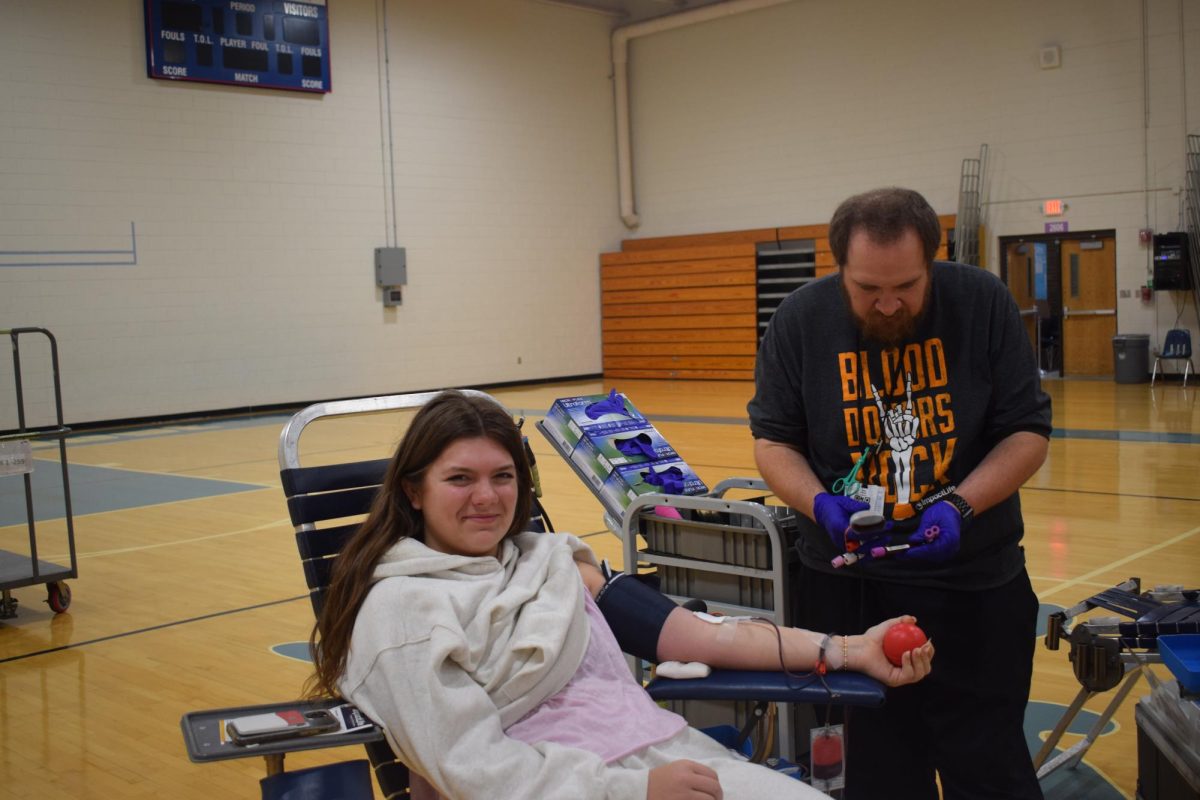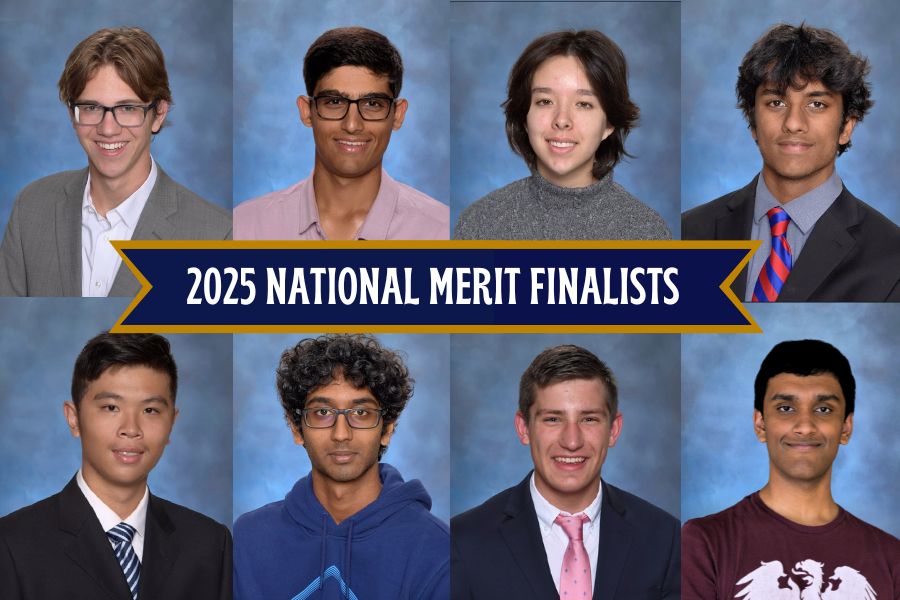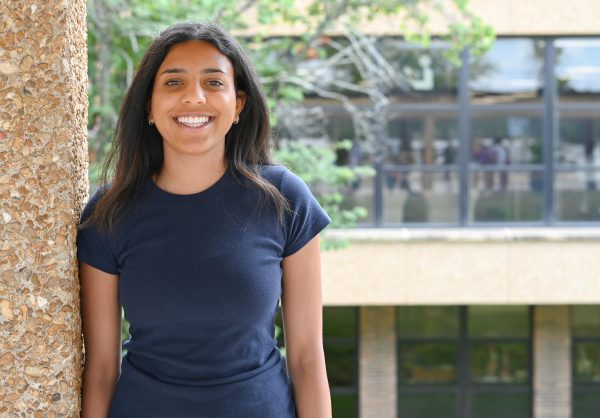This Halloween, Oct. 31, the National Honor Society (NHS), Red Cross Club and Key Club came together to organize a schoolwide blood drive. With more than 30 students and staff giving blood, this year’s turnout was larger than ever before.
Key Club, a service-based association for high school students, recently partnered with the Blood Drive’s long-time host, NHS 一 a co-curricular student organization that prioritizes character, leadership and service 一 for this year’s drive. Key Club sponsor and English teacher Andria Benmuvhar helped to organize the recruitment and execution of the event.
“I [took] the time to figure out who can donate [at] what time [and] figured out what classes [students] have. I helped out with logistics of getting all the students and faculty down there for the day,” Benmuvhar said.
Prior to the blood drive, students from NHS and Key Club recruited donors at lunch. With a table set up in the front, student volunteers spread the word about the importance of the blood drive.
“At every lunch for two weeks, we had [students] down in the cafeteria recruiting. NHS and Key Club students got [service] hours for the recruiting people, so that was an extra incentive this year. Students could also get service hours for donating,” Benmuvhar said.
Benmuvhar planned all components and communicated with a contact from Impact Life, an organization that collects and distributes blood products within the St. Louis area. NHS and Key Club co-president and senior Laith Alhamid worked with Benmuvhar and Impact Life to help set up the event. Alhamid recruited donors prior to the event through flyers, email and word of mouth.
“The big thing has been going up to people and asking them to donate blood. Donations are so important to hospitals because without blood, many patients would not survive severe traumas. A little goes a long way in this case, and it is a really beneficial thing,” Alhamid said.
Impact Life required that donors were at least 16 years of age, so many juniors and seniors gave blood for the first time. In turn, donors had the opportunity to receive up to two service hours from the NHS and a 10 dollar gift card to any location of their choice. Junior Grace Garetson gave blood for the first time this Halloween.
“I’ve always wanted to give blood [and] help out the medical field, whether it’s being an organ donor or a blood donor. I haven’t been eligible because I haven’t been old enough. [However,] this year, I’m finally old enough,” Garetson said. “[I was] nervous about needles, and this was another way to push through [without] getting nervous and prove to myself that they’re not that scary.”
Many students chose not to donate due to potential risks or scares 一 passing out, a scare of needles and HIV concerns. With experienced professionals, however, Impact Life ensures the security of their donors.
“[Impact Life] sent nurses to the school to take the blood,” Alhamid said. “I’ve donated the last two years at the blood drive, and it’s not hard. There is a big misconception about needles but getting your blood drawn is quick, easy and nice to do.”
Donations took 45 minutes to an hour, depending on the student or staff member. Each donor filled out a private medical questionnaire, completed a physical and was verified for suitable iron and hemoglobin levels before getting their blood drawn.
“I had a great experience with donation, and I would 100 percent recommend it to people who are capable of donating. The nurses were nice and friendly, so I had an amazing time,” Garetson said.
No matter why students or staff donate, their impact on the community can be substantial. According to Red Cross Blood Donation, people in the U.S. need blood every two seconds. Moreover, Impact Life’s blood drive will keep blood local and potentially save up to three lives.
“Hospitals are always in need of blood, and a lot of times, we think we’re going to donate blood in an emergency like a hurricane or earthquake, but people need blood all the time,” Benmuvhar said. “[Donation] doesn’t hurt, and it can help people out [in the] long term, especially if you’re a universal donor.”



![Smiling in a sea of Longhorns, Fox 2 reporter Ty Hawkins joins junior Darren Young during the morning Oct. 3 pep rally. The last time West was featured in this segment was 2011. “[I hope people see this and think] if you come to [Parkway] West, you will have the time of your life because there are so many fun activities to do that make it feel like you belong here. I was surprised so many people attended, but it was a lot of fun,” Young said.](https://pwestpathfinder.com/wp-content/uploads/2025/10/Edited2-1200x798.jpg)
![West High seniors and families listen as a representative of The Scholarship Foundation of St. Louis, Teresa Steinkamp, leads a Free Application for Federal Student Aid (FAFSA) workshop. This session, held in the library, provided guidance on financial aid, scholarships and student loan options. “This event is very beneficial for any seniors who are applying to or considering applying to colleges after high school [because] the cost of college is on the rise for seniors and parents,” college and career counselor Chris Lorenz said.](https://pwestpathfinder.com/wp-content/uploads/2025/09/DSC_4478-1200x778.jpg)
![Senior Kamori Berry walks across the field during halftime at the Homecoming football game on Sept. 12. During the pep assembly earlier that day, she was pronounced Homecoming Queen. “I thought it was nice that the crowd [started] cheering right away. I know [my friends] were really excited for me, and my family was happy because typically non-white people don't win,” Berry said.](https://pwestpathfinder.com/wp-content/uploads/2025/09/DSC7046-Enhanced-NR-1200x798.jpg)



![Pitching the ball on Apr. 14, senior Henry Wild and his team play against Belleville East. Wild was named scholar athlete of the year by St. Louis Post-Dispatch after maintaining a high cumulative GPA and staying involved with athletics for all of high school. “It’s an amazing honor. I feel very blessed to have the opportunity to represent my school [and] what [it] stands for,” Wild said.](https://pwestpathfinder.com/wp-content/uploads/2025/05/unnamed-6-1200x714.jpg)
![The Glory of Missouri award recipients stand with their certificates after finding out which virtue they were chosen to represent. When discovering their virtues, some recipients were met with contented confirmation, while others, complete surprise. “I was not at all surprised to get Truth. I discussed that with some of the other people who were getting the awards as well, and that came up as something I might get. Being in journalism, [Fellowship of Christian Athletes and] Speech and Debate, there's a culture of really caring about truth as a principle that I've tried to contribute to as well. I was very glad; [Truth] was a great one to get,” senior Will Gonsior said.](https://pwestpathfinder.com/wp-content/uploads/2025/04/Group-Glory-of-Missouri.jpg)


